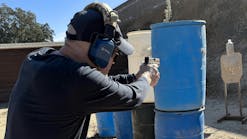ST. PETERSBURG, Fla. -- On the 75th anniversary of Kristallnacht, a night of terror, destruction and bloodshed that spurned the events of the Holocaust, the Florida Holocaust Museum announced a new partnership with the Tampa Police Department to ensure such hatred never engulfs Tampa Bay.
Within the next few months, every police officer and new recruit in the Tampa Police Department will attend lessons taught by Holocaust museum staff on the role police agencies played in the Holocaust. They will also be challenged to reflect on their professional and personal responsibility to ensure that "government sanctioned" hate crimes like those that led up to the murdering of about 6 million Jews never happen again, said Elizabeth Gelman, executive director of the Florida Holocaust Museum.
"Our goal for the museum is that it's not a static place, it's not a place to merely memorialize the dead but to use those lessons to create a better future for all of us," Gelman said. "I think now, police everywhere are dealing with issues of protecting ones citizens from harm and protecting their rights. It's really a wonderful way to look at the police role in democracy, because, of course, Germany was a democracy."
The five-hour course, titled "Law Enforcement and Society: Lessons of the Holocaust," follows the same curriculum taught to officers by the U.S. Holocaust Memorial Museum in Washington, D.C.
Tampa Police Chief Jane Castor approached Gelman with the idea of offering a version of the program, and museum employees immediately started training with the help of the national museum and the Anti-Defamation League.
Through the program, officers will tour the museum and learn how thousands of police within Nazi-controlled areas were used to deport and murder their Jewish neighbors until the war ended in 1945. Kristallnacht, or "the night of broken glass," was organized by police after a German diplomat was assassinated by a Jewish teenager. The coordinated attacks on Jewish communities throughout Germany and parts of Austria killed about 100 Jews and destroyed thousands of homes, synagogues and businesses. Police encouraged civilians and even children to join in the destruction, and though the event was widely reported around the world and even The New York Times it still sparked the Nazi's "Final Solution."
"I believe that one of the many reasons that we commemorate Kristallnacht is to be reminded that evil and dehumanizing exists and must be recognized as it is starting," said Nancy Goodman, a psychologist and psychoanalyst from Maryland who spoke to dozens museum visitors and about 15 Holocaust survivors Sunday about her book of Holocaust accounts titled "The Power of Witnessing." The highly-visible destruction of Kristallnacht did not happen in a vacuum, she said, yet because no one intervened it paved the way for "unimaginable evil."
"The same is true for any forms of abuse, humiliation and terrorizing," she said. "We witness this every day, whether it's in places far away, on the playground, in the workplace or in the privacy of a home ... It starts in small ways and then builds."
The police training warns against any form of dehumanization, and according to the national museum about 80,000 officers from the U.S. and 80 countries have participated in the program since its inception in 1999. Adding Tampa to that list seemed to immediately answer Holocaust survivor Marie Silverman's prayer offered in memory of Kristallnacht.
"Compassionate God, bless the leaders of all nations with the power of compassion," she prayed. "May we see the day when war and bloodshed cease, when a great peace will embrace the world."
Copyright 2013 - Tampa Tribune, Fla.
McClatchy-Tribune News Service


